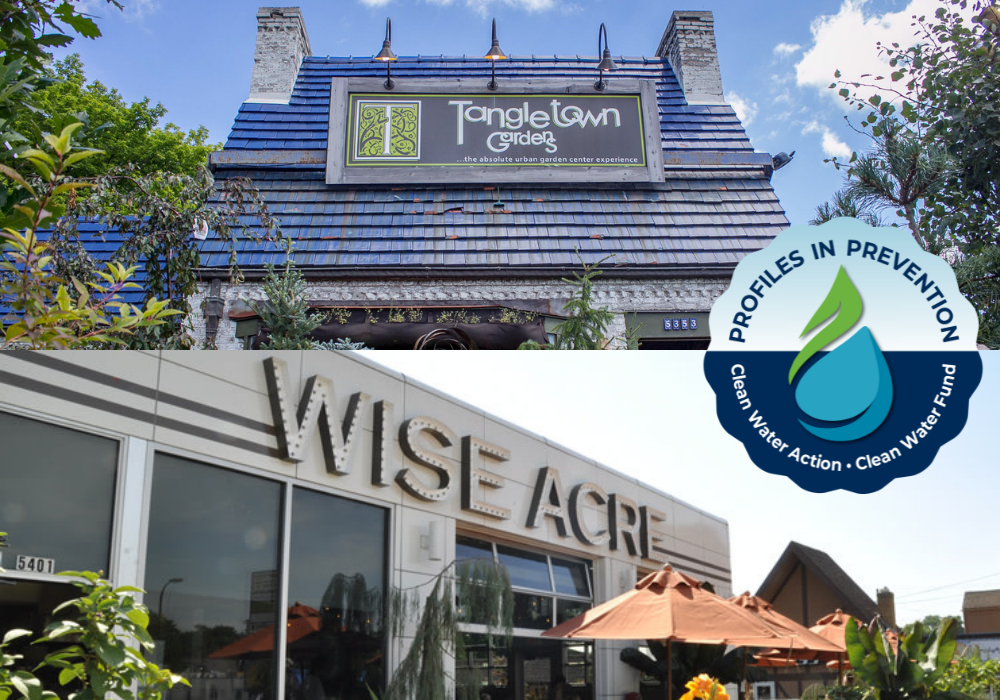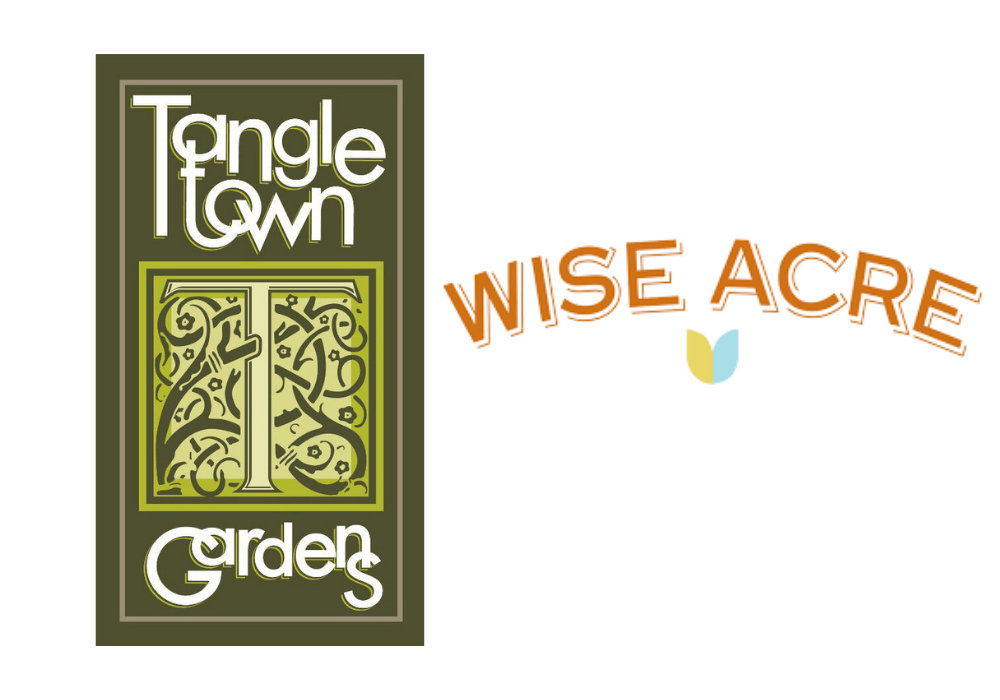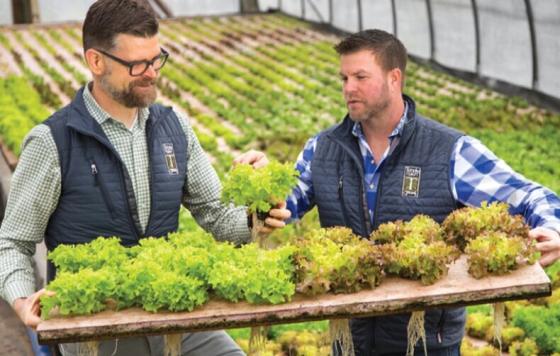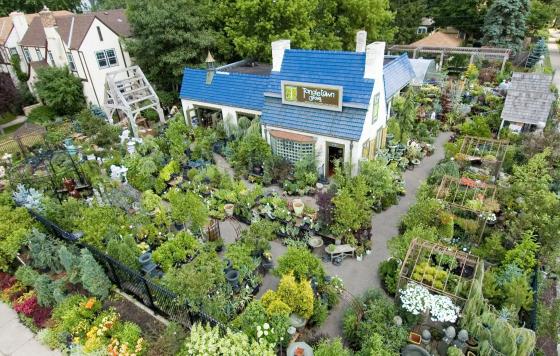
Clean Water Action and Clean Water Fund are recognizing the people and organizations who have made choices that have prevented pollution from entering our environment. Some actions are big, some are small, but all of them matter.
Want to nominate an individual or a company? Visit this page to complete the form.
Wise Acre Eatery and Tangletown Gardens are staples in South Minneapolis. People typically know them for their restaurants and garden center, but did you know that they have a 140-acre farm in Plato, MN where they sustainably grow produce and raise animals?
Co-owners Scott Endres and Dean Engelmann are the dream duo that started both Wise Acre Eatery and Tangletown Gardens. They met as horticulture students at the University of Minnesota, became friends, and started both businesses with the goal of following ecological principles that produce the most nutritious food possible while respecting the earth in order to preserve the earth for future generations.
Planting the Seeds
Opening Tangletown Gardens was a huge success due to a lot of marketing and the way that they merchandise and present products to guests. Their focus was on the small details such as being customer and community-focused, being passionately creative, and staying relevant. They quickly realized that the retail store was on a small city lot, and they needed more room to continue being competitive. The farm Engelmann grew up on was the perfect location for more space. Endres and Engelmann started out small, with a little hoop house and renting just a quarter of an acre, but their success quickly added the need for the full 140 acres of land.
Everything was going smoothly until the 2008 recession hit. Both Endres and Engelmann realized that they needed to diversify and become more self-sufficient. The idea to grow food and produce was born. In 2009, they launched an in-house farmers market at the garden center, which brought customers in weekly instead of seasonally. They launched their CSA program in 2010 with over 300 memberships in their first year and also started their farm-direct program. Wise Acre Eatery was opened in 2011, which set them apart and gave them the opportunity to differentiate their CSA. The restaurant provides endless cross-promotional opportunities, ways to support other sustainable farms, and space for displaying the gardens.
How are Tangletown Gardens and Wise Acre Eatery sustainable?
Tangletown Gardens and Wise Acre Eatery are both focused on sustainability throughout their whole process. From when a seed is planted to when it is sold at a farmers market, every step is planned with care. Their motto: healthy soil = healthy plants = healthy animals = healthy people.
Endres and Engelmann approach farming with a holistic mindset. They incorporate animals into their fields, operating with rotational grazing and being grass/hay fed and finished. Animals are allowed to graze the fields twice a day, ensuring that all the organic matter and nutrients that are left behind stays in their fields, feeding their crops. This practice is even done during the winter when soil health is usually neglected.
On top of utilizing animals to help with soil health, they are focused on minimizing their carbon footprint. All meats and produce travel a maximum of 50 miles from where they are produced to where they are sold. This process creates essentially a closed-loop system that greatly reduces the amount of transportation greenhouse gases which is a main source of pollution in the agriculture world where the average transportation for meats and produce between field to store is over 500 miles.
“We have a little model at the Wise Acre that is kind of the mantra of the restaurant — it’s the shortest distance between the earth, the hand, and the mouth,” Endres said to Gardencenter Magazine. “But it’s true for the garden center, as well. We want to produce the annuals, produce the perennials, produce everything we can right here.”
Building a Sustainable Business from the Ground Up
Additionally, the farm is a toxic chemical-free environment. Healthy soil is the base for growing healthy food and clean water. If a farmer uses harmful chemicals and pesticides, the soil will eventually not be able to thrive on its own.
Using pesticides and chemicals results in many negative environmental issues, including:
● Pesticides allow disease resistance to build up in plants, weeds, plant-eating insects, fungi, and bacteria.
● Pesticides and chemicals sprayed on plants contaminate the soil, water supply, and air. Sometimes these harmful pesticides stick around for decades (maybe longer).
● Synthetic chemicals also discourage smart farming practices such as cover crops and crop rotation, which in turn, may cause other harmful environmental problems like erosion.
In addition to being a toxic chemical-free farm, they are also a hormone-free farm. Hormones are used on farms for one reason: faster weight gain. Growth hormones allow farm animals to be raised in smaller living spaces while yielding higher weights. Growth hormones pose a potential health risk to humans and are even banned in other countries. By raising produce and livestock as naturally as possible, the entire food chain from farm to table is healthier for the environement, animals - and humans.
Overall, Wise Acre Eatery and Tangletown Gardens are going above and beyond to protect our environment and educating the community around them to do the same. They provide classes throughout the year, are active in community education and outreach (Wise Acre Chef Dan Schmit joined Field to Fork for a virtual sustainable cooking demonstration in 2021 - watch it here!), and have endless knowledge to help you start your own oasis and garden at home.
To learn more about Wise Acre Eatery and Tangletown Gardens, please visit www.tangletowngardens.com and www.wiseacreeatery.com.

Clean Water Action, in cooperation with Clean Water Fund, have reviewed publically available information presented by the companies and individuals highlighted in the Profiles in Prevention. We have provided this information to the companies and individuals for review. Being highlighted in Profiles in Prevention does not indicate any endorsement of the company or any of its products. Clean Water Action is not responsible for any misinformation that may be presented in the original source documents. For any questions, please email minneapolis(at)cleanwater(.)org.


